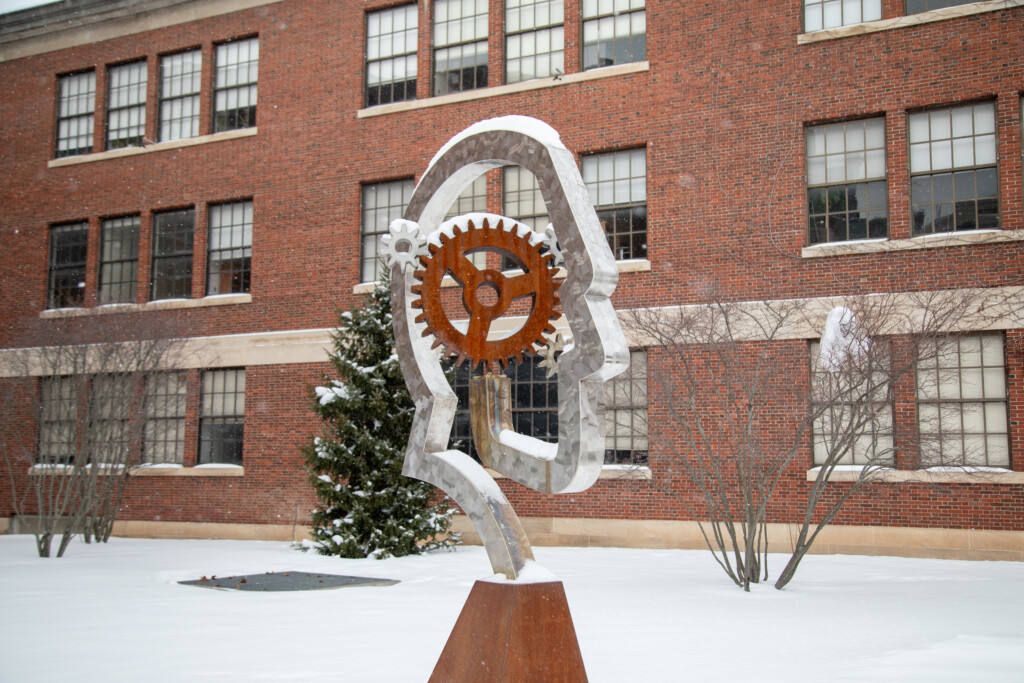The Washington Bureau Chief of the New York Daily News Thomas DeFrank shared his insight into the 2008 presidential election last Thursday with an attentive crowd of UR students, faculty and alumni.
DeFrank drew on personal stories from his 37 years as a Washington reporter to entice the overflowing Welles-Brown room in Rush Rhees Library. He began the talk by painting a famous scene from 35 years ago, when President Richard Nixon stepped onto Army One on the White House lawn after resigning from the Presidency.
His account of Gerald Ford’s communication with Nixon after his resignation added a personal touch, a glimpse into the intimacy of the moment. “‘I really feel sorry about this,’ Gerry said to Nixon. ‘Don’t feel sorry. It’s not your fault,'” DeFrank said.
DeFrank’s relation of the interchange between Richard Nixon and Gerald Ford was the first of many stories that widened eyes and brought laughter from those in the room.
“The greatest story I ever covered – most people assume it’s Watergate, which is up there at the top,” he said. DeFrank, who has covered seven U.S. presidents since he began reporting from the White House in 1970, told the audience about his coverage on Feb. 13, 1973, which he said was “the only story I ever covered where every reporter on the tarmac was in tears.”
On that day, DeFrank was at Clark Air Base in the Philippines as he watched GIs return home from Vietnam. “I can still remember John S. McCain coming off on crutches,” he said.
“‘Nobody in this outfit is going to come off in a wheelchair,'” DeFrank recalled McCain saying.
A question he is always asked, DeFrank continued, is who his favorite president was. In order to remain bipartisan, he conveyed whom his favorite was to cover as a reporter.
“George H.W. Bush,” he said. “You would never know what he was going to do, what he was going to say. You never knew how the words would come tumbling out of his mouth.”
DeFrank soon segwayed into matters relating to the current presidential election.
He explained that the 2008 election year is the first election in 56 years in which no president or vice president is running for the seat, the first time that a woman, an African American, a Vietnam veteran and a Mormon were all in the presidential race at one time, and the most heavily frontloaded primaries in history – all of which has led this to be, according to DeFrank, “a historic election on many levels.”
A large amount of DeFrank’s talk was spent on his own predictions for the rest of the election, although he made sure to say that this election “is still very much up for grabs.”
He later explained that a wild card dominated the race. “I think the American people are sick of Washington,” he said. “I think the American people are heartsick on the Iraq War.”
But he was absolutely sure about two predictions.
“One, do not believe the doomsayers or woe-cryers. Two, he or she [the future president] is going to take fewer vacations than Ronald Reagan.”
DeFrank intimated one major theme throughout his talk – “politics is the art of the utterly unpredictable.” His opinion was that this election has already proven this true – he cited Senator Hillary Clinton’s rapid fall from the top and Senator Barack Obama’s win in a predominantly white Iowa as the first of many examples illustrating this theme.
DeFrank ended the talk with the same caveat. “All sorts of things will happen in the next nine months,” he said. “2008 depends.”
DeFrank was the fourth speaker in the speaker-series section of Politics and Media Construction: Anticipating the 2008 Election, a Humanities Project initiative lasting throughout the 2007-08 academic year.
The next speaker in the series is award-winning columnist Fred Dicker, state editor of the New York Post.
UR President Joel Seligman kicked off the Humanities Project with a grant of $100,000 per year, for three years, in July 2006. It was improved upon when Seligman offered another $50,000 per year to the project in early 2007, in addition to extending the Project so that it would last the length of his presidency.
Other events this year include History and Philosophy of Physics and The Medieval West: Contemporary Views.
Assistant Professor of English Stephanie Li and Assistant Professor of Political Science Valeria Sinclair-Chapman are heading the Politics and Media Construction initiative.
“By drawing upon the expertise of humanities scholars, we may better understand how representations of political figures and the democratic process affect public perceptions and our own political engagement,” Li said.
Students jammed the small room to hear DeFrank speak.
“I thought he was really informative and he brought up some interesting points,” senior Denise Moseman said. “I liked his personal insight into the White House.”
Mike Gleason ’69 described his reaction to the lecture. “It was absolutely fabulous. He’s one of those old, shrewd, insightful guys. I think he’s as square a reporter as they get,” he said.
Epstein is a member of the class of 2010.

